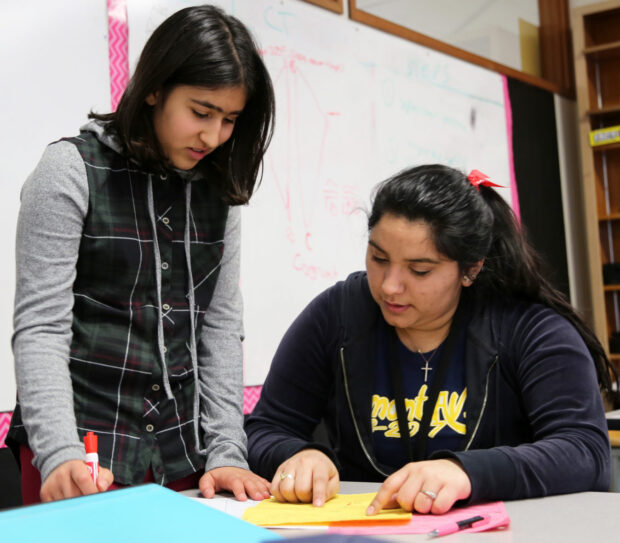Paul Altorfer doesn’t teach a subject at Fairmont Junior High. He teaches students how to prepare for other class work.
Altorfer’s elective class is called Advancement Via Individual Determination (AVID) — a national program aimed to prepare students for college and life after K-12 education.
When students arrive daily, they hand him a “tutorial request form,” which lays out questions from coursework they’re struggling with in other classes.
Altorfer sorts students into groups with similar points of confusion — English, math and science groups.
“AVID forces students to face challenging material head-on,” Altorfer said.
In the 2015-16 school year, Fairmont AVID students owned a cumulative grade-point average of 3.03, ahead of the 2.7 grade-point average for all Fairmont students.
“I think the biggest thing that we notice after we introduced the AVID program was the number of students taking accelerated classes,” Altorfer said. “Students struggled at first, but with the new AVID strategies they improve.”
The program
AVID was created more than 30 years ago by a global nonprofit. Students in the program typically speak English as a second language, are struggling in school or are expected to be the first in their family to go to college. The program is available in all the junior high and high schools in the Boise School District with nearly 1,300 students participating.
Students apply and go through an interview process to be accepted into the program. Those accepted learn specific strategies and skills that will help better prepare them for higher education. They are taught how to organize a binder, manage their schedules and track their grades.
Students focus on five core educational areas — writing, inquiry, collaboration, organization and reading. These learning strategies helps teachers guide students through the curriculum and provides students with learning tools that last beyond college graduation.
“We want to close the achievement gap,” said Niki Jones, an AVID teacher at Fairmont. “You want kids to have confidences to know they can do whatever is needed to be successful beyond being in a classroom.”
Fairmont AVID elective classes bring in college tutors two days a week. In addition, guest speakers visit and other teachers in the school frequently provide feedback on how AVID students are performing in their classes.
Other days, students receive lessons on reading, writing and studying. They’ve all been schooled on a form of note-taking called Cornell Notes. They also take field trips to colleges in the region. All of this is done to prepare students for the more rigorous coursework they’ll encounter in high school. It’s also done so they can understand that they can go to college.
For Kevin, a seventh grader at Fairmont, AVID is more than a prep program. It also is a support service where he can find encouragement and a push towards achieving his best in school.
“I want to attend college and live in a good home,” Kevin said. “AVID is taking me down that path.”
AVID teachers try and provide a family atmosphere and they allow students to find an identity.
“The only family a lot of these kids have is the AVID class and teacher,” Jones said. “These students feel they are in a safe place and as a teacher you’re a support system.”
The results
Of the 800 students at Fairmont, 238 enroll in AVID and nearly 93 percent of AVID students take accelerated courses and pass those with a C or better. About 140 incoming seventh graders are on the waiting list for next school year.
“We believe it’s better to take a rigorous accelerated class and get a C than take a general class and get an A,” Altorfer said.
Fairmont is a national demonstration school — it’s the highest of recognition an AVID school can achieve and the only school in Idaho. Fairmont underwent a validation process that is required every two years to ensure fidelity to AVID strategies.
“It’s a lot of work, but worth it,” Altorfer said. “More involvement in junior high means more students will be better positioned to succeed in high school.”


